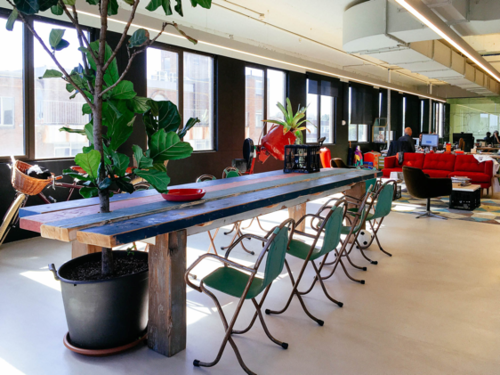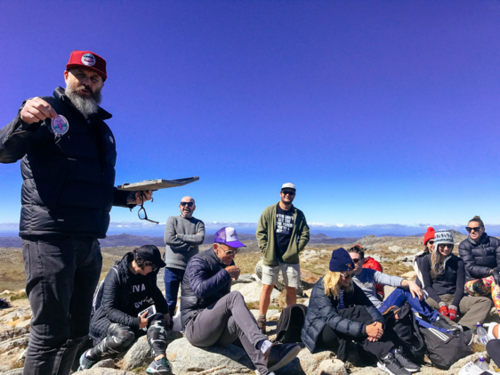An Interview with...Dan Beaumont, Managing Partner at The Royals
Early 2017 the inaugural People & Culture Award, founded by iknowho in collaboration with AdNews was awarded at the AdNews Agency of the Year Event. A staggering 7 finalists were announced in the category, and all were winners in our eyes. Each entry outlined incredible initiatives to enhance their culture and demonstrated that their people are critical to their success. We will share the best of the best with you from our series of interviews with the 6 finalists and the winners. Our Director Dene caught up with Dan Beaumont, Managing Partner at The Royals to learn about their initiatives in the first in the series.
What does people and culture mean to your business?
Culture is everything at The Royals, it’s genuinely at the centre of who we are. The Royals are a people business. And AI won’t change that. Our people are our lifeblood. We create intellectual property developed by people. So, if we don’t look after those people, we don’t have a business. Therefore, nurturing and protecting our culture is critical to our success.
Our company culture is built around the desire to be “the most interested agency in the world”, supported by our three core values of Audacity, Camaraderie and Revelry. It’s our mission that permeates everything we do – the people we recruit and work with, how we search for real insights and identify opportunities for brands, the way we behave and work with our clients, and most importantly the kind of work we create.
What prompted you to enter the award?
Culture seems to be the new agency currency, as strange as that sounds to say out loud. However, we recognise that it’s always been important to promote a great working culture because that’s what attracts great people to you. If we can be one of the best agencies in the country, then people will want to come and work at The Royals. I think attracting talent is one half of the reason to enter awards like this (along with creative awards), and the other half is recognition for everyone within the business. We want people to be proud of the agency they work in.
How would you describe the culture of the business currently?
Interested and Interesting. Everything we do, all the actions, tasks and initiatives we implement, need to be helping cultivate people’s curiosity, motivating it, while making sure there are real learning outcomes.
How do you believe employee happiness is connected to business success?

Nthink they are intrinsically related. We’re a people business; if people are happy doing what they’re doing, if they are challenged, if job satisfaction and engagement is high, then they are far more likely to do a better job and to work hard to think more laterally and proactively on behalf of our clients.
If clients are experiencing people at The Royals who listen, who are interested and hungry to learn more, then that will produce more effective work and stronger relationships.
How do you drive continuous innovation for your people within the business?
It’s a hot topic of conversion at every management meeting. We review our people every month by discussing performance and potential across the group. We have engaged
Culture Amp to survey employee engagement. In our first survey in 2016, we achieved an engagement score of 81%. It’s extremely high – and well above the industry average of 67% – but we’ve got lots of ideas to improve things around the place.
Out of this first culture and engagement survey, we formed a Culture Team made up of people within the business – this is to help us take the actions from that engagement survey and implement better ideas. We don’t want to push initiatives from the top down, we want our people to help us and make sure actions are being implemented.
What’s been your most successful initiative?
We had an idea to encourage people to do things that they’ve never done before. When I say “we”, I mean a staff member from our Culture Team did. Once a month, at our Monday morning assembly, we draw a name out of a hat, and out of a second hat we draw an activity. These are things that nobody in the agency has done before, like learning how to keep bees, how to master the trapeze, drive an uber, take a Special-FX prosthetic makeup course or a fencing masterclass. It helps us to see things differently. It’s been very received well and produced some amusing content that we’ll edit for our social channels.
Who leads the people initiatives within the business?
There isn’t just one person, our cultureis delivered by a number of people in the agency. Our Talent Manager is heavily involved of course, and she helps to run our program with the Culture Team. But every line manager is also responsible day to day as is every staff member. We conduct quarterly performance reviews, which gives people regular feedback. They are less formal but our people still have performance indicators, and need to be able to demonstrate how they’ve lived #mostinterested for the business. Essentially it comes down to everyone to make it work.
Where do you stand on merit vs quota?
As a business and as individuals, we are strongly in favour of gender diversity – and overall diversity. We believe a lack of diversity means a lack of relevance. However, I’m not convinced that quotas are the right way to overcome diversity issues. The biggest problem in this industry is that there is a shortage of experienced women for more senior roles, and that’s because traditionally it’s been hard for them to return from maternity leave thanks to the long hours and lack of flexibility within agencies. So now we are in a position where agencies are fighting over a small pool of women in the workforce for management and senior roles, and we’re missing out on a lot of talent that has decided not to return to the industry. It’s something we all need to address. We’re actively trying to fix this and I’m proud to say that The Royals have a 100% return rate of staff from maternity leave.
What practices do you have in place to encourage a diverse culture?
The Royals don’t have a policy. I don’t think we should be actively searching for particular types of people to fulfil a quota. I think that’s the wrong way to look at things. When The Royals are recruiting the best people for the job, it’s more important to us who you are and how you think. We recruit based on a psycho
graphic profile not a demographic one.
The Royals hail from 15 different countries and we speak 12 different languages (unfortunately I don’t), while ages span three generations. We simply aim to recruit unique, talented and interested human beings – and it doesn’t matter where they come from, what they believe in or what colour their skin is. Quotas are nonsense as they force you to judge and profile people.
We have a very strong ethos when it comes to helping women (and men) find that balance between family, work and their careers, and making it as easy as possible for them to come back

to work. We are very flexible and encouraging with new mums, they can take as much time as they need and we hold t
heir jobs open. In fact, in the past 12-18 months, we’ve had around 12 instances of maternity leave and we’ve held all those roles open. Seven of our 10 permanent P/T staff are working mums whose roles are tailored to their individual needs.
Does your agency support flexible working? If so how?
We have people in Melbourne working on Sydney clients and vice versa, so that forces a geographical flexibility – we’ve always got people in an aircraft everyday between the two offices and between client meetings.
Overall, we promote flexible working hours to encourage work-life balance and accommodate family commitments. This might mean later starts or earlier finishes to do the school pickup. It might also mean an ability to move working days in the week to accommodate school hours/ holidays/ sick kids etc.
All of our software is geared so that anyone can access information and working tools in the cloud. We encourage a lot of collaborative working through Google slides and Google hangout – particularly with our clients. If people want to work from home because they have a big presentation or strategy to crack, then no problem – people don’t have to be in the office to do work things, and we’re comfortable with that.
Also, we help people find different roles within the agency, and equip them for those roles, in order to strike a better balance. Aside from family commitments, one member of staff wanted a couple of days a week to pursue her own creative outlets, so she works with us 2-3 days a week, and then works on her own projects. Instead of getting a pay rise, another staff member works 9 days every fortnight and has one day off to pursue writing a film script. We are completely supportive of our people and their goals in life.
What do you think the industry as a whole could do better when it comes to flexible working?
As an industry, expectations have to shift slightly, actually a lot. Everyone in advertising works bloody hard. It’s becoming more competitive and to do well we have to go above-and-beyond with less money and less time. The industry I grew up in demanded 12 hours a day. I remember 42 hours without any sleep to get a campaign out. Christmas catalogues are like that.
But the world is evolving – mainly driven by the ‘gig-economy’. The industry needs to do more – we all need to be more patient, more understanding that to do great things takes time and we should value output more than we value the time it takes to make it. This should provide businesses the chance to give people more flexibility, not just the hours but the location and how they get their jobs done.
Why do you think your team loves working here?
The feedback we’ve got is that we genuinely care about people. As we own our business, we are immensely proud of the people in it, and like parents we care about the people we are responsible for. We have an ethos of ‘we give before we take’, and that genuinely caring about our staff and their wellbeing makes good business sense.
Staff have also mentioned that they enjoy our open forms of communication. This is important – there is very little that all staff don’t know about or understand. We are open plan, we don’t have departmental splits, and everyone is informed on the direction of the company, our vision and what we think success is.
What do you think are the top 3 perks?
One - Working environment: our office spaces are fantastic creative spaces. We have quiet thinking areas, lots of greenery, great views of each city with loads of natural light, interesting furniture and music controlled by all. We’re always stocked with great coffee and breakfast supplies. It’s probably not too different to most indie agencies but they don’t have a ‘Nick’. The Royals have a ‘Nick’. A ‘Nick’ is our Creative Partner, Nick Cummins. Every weekend he’s at an auction house somewhere collecting weird and wonderful pieces of furniture for the offices, so that our interior design is unique and not like most other work spaces. This does mean we have some really wierd shit lying around, so it goes straight to the “pool room”.

Two - One egg with two yolks: The Royals operate as a single agency so we get together regularly. Every year we have an ‘Unconference’ at a great destination for a long weekend. We’ve been to Hobart, Byron Bay and we’ve just come back from Thredbo where the whole agency hiked Kosciuszko mountain; at the top we gave out merit badges across each of our values – Audacity, Revelry and Camaraderie. We have a Monday morning assembly via a Hangout and an active “Buddy system” so that people can visit their sister office regularly. Then there’s the Christmas Party…
And Three
- I think the opportunity to skill up in any given area. If someone is interested in learning about new forms of communication, all they need to do is let us know. If people want to go to SXSW, then we will buy them a ticket. If you want to do a course at General Assembly, catch a session at TedX, Vivid, Semi Permanent or any industry conferences, we’ll buy the tickets – you just have to show interest.
Do you think being a smaller agency limits you when it comes to culture?
No, I think it’s the opposite. In my experience bigger agencies struggle with culture. Our challenge is to carefully protect what we have as we move from 65 to 165 people. We’ll do this by reinforcing our values through every facet of the business and ensuring that our processes are robust and flexible enough to scale up without stressing people out. To aid this evolution we treat The Royals ‘ways of working’ a bit like an operating system (rOS). We fix bugs, improve functionality and constantly upgrade how we roll day to day. It ensures that we never stand still and that we stay relevant as a business model. People handle smaller adjustments better over time than wholesale changes.
Lots have been written of late about agency talent moving client side – what do you think agencies could be doing better to limit this?
Firstly, I think having agency people client side is a great thing, for many reasons. And agencies would prosper from clients moving over to the agency, but this happens far less. And here’s the issue. It’s one-way traffic. Better hours, more pay and more control are probably some of the factors. Agencies can only improve a few of these, so maybe it’s just inevitable that there’ll be some movement.
What three words would you use when summing up the culture at The Royals?
Revelry, Camaraderie and Audacity – those values are deeply entrenched in who we are and how we act and behave every day.
Revelry is about being passionate about what you do, and bringing all your energy to work every day. Audacity is about being brave creatively, and asking any question no matter how it makes you look. You’re always better off knowing an answer than being silent and ignorant. Camaraderie is working hard to act as one agency and working collaboratively with our clients, even though we are split by some distance.










